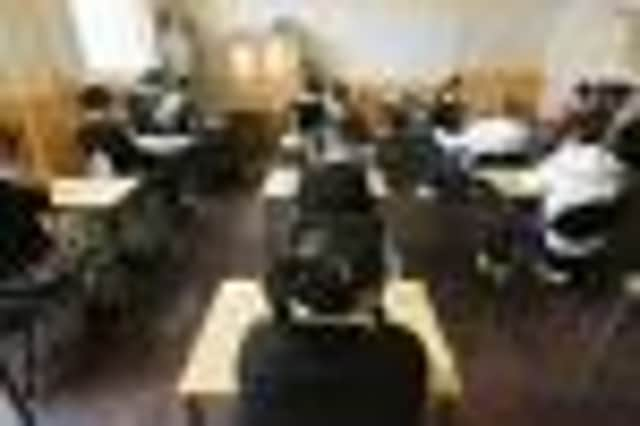Comment: Unease about politics in the classroom


All through the bitter controversy over section 28 and introducing questions about sexuality to our classrooms, I never once doubted that our political system would allow the educational authorities to strike the right balance. The politicians would surely recognise where the line must be drawn that prevents them from exerting direct influence in our classrooms.
But recently I’ve wondered whether we are about to enter a dangerous area when it comes to politics and education. The myopic obsession with independence overshadowing pressing social and health issues is now threatening to impinge on the neutrality of our classrooms. So do we need to ensure our schools are protected from political dogma, or is it essential that our young voters and citizens of the future are properly grounded in the issues of the day?
Advertisement
Hide AdAdvertisement
Hide AdThe question was provoked by comments from a surprising, and highly respected, source: Deputy First Minister Nicola Sturgeon. Speaking to the Holyrood committee scrutinising plans for the referendum legislation, she said the government would be looking to ensure as “wide an appreciation and knowledge and understanding of the white paper as possible”. Which is not in itself controversial. But then she added the phrase “including those in younger age groups” – and promised to consider placing a legal duty on schools to promote the referendum to 16- and 17-year-olds.
Perhaps most controversially, this is a white paper that Ms Sturgeon has reportedly described as “setting out the case for Scotland becoming independent”. Her comments prompted instant reaction from the opposition, who claimed it could mean promoting not the referendum, but independence itself, in our schools.
Liberal Democrat Tavish Scott accused the Holyrood administration of planning to provide propaganda to every 16 and 17-year-old, with tax-payers footing the bill.
For the past two years, and until the referendum is settled, our schools will be hotbeds of debate. It is right that senior pupils should be taking every opportunity to investigate, challenge and discuss all of the arguments before they vote on their future, and ours.
Our teenagers are well used to visits from MPs and MSPs of all parties, often asking them questions as challenging as anything Mr Paxman could come up with. Visits to both our parliaments are part of a curriculum which already encourages an interest in current affairs.
But surely our schools and their teachers should not be asked to present “the case” for any political argument? It’s not what I want as a parent and it would put our teachers in an impossible situation.
I applaud the fact that our system has developed a strong modern studies curriculum which helps develop political awareness. However, I would not want that to morph into an endorsement of the job the government of the day –whatever its political make-up – is doing, or a positive critique of their latest set of policies.
That would cross that important line I mentioned. Balance could disappear from the political debate.
Advertisement
Hide AdAdvertisement
Hide AdIt’s a danger we have gone to great lengths to guard against elsewhere. Broadcasting is an obvious example. During every election the Representation of the People Act ensures that the “case” for one party is not represented at the expense of any other.
As a young BBC Scotland reporter, I played my part in accurately logging every clip, comment, interview, or reference to a political party that we broadcast, to ensure we maintained balance in our election coverage. It was our job to present all the information. Not to influence. It is the same for schools.
Elsewhere, we have an Electoral Commission that is specifically charged with supporting a democracy with elections and referendums based on the “principles of trust, participation, and no undue influence”.
If Ms Sturgeon – or any other player in the referendum debate – is concerned about a widespread understanding and appreciation of the issues, the solution is already in her hands.
There is no lack of opportunity to present the detailed case for independence in the news media, social networks, or by getting out there and knocking on doors.
Indeed, many of the SNP’s opponents are crying out for them to give us exactly that. We would all like the detailed case the Deputy First Minister is promising, rather than the broad visions of a Scotland they promise will be better without telling us how.
But if they do not abandon this notion of taking their message into our schools to present “their case” for independence, they may find that “better” Scotland becomes increasingly difficult to sell.
Previous generations of Scots have been perfectly capable of not only appreciating and understanding a variety of political philosophies and ideals, but also of helping to shape them.
Advertisement
Hide AdAdvertisement
Hide AdThe modern Labour Party owes much to the influence of John Smith. Liberals, too, are steeped in the influence of Scots like David Steel and Jo Grimond.
And a generation of Scots at Westminster and Holyrood did not need guidance from the government of the day to reach their own political conclusions.
I wonder why the Scottish Government appears to feel that this vote and this generation is different, in need of more guidance?
I don’t think that it is. The young people who vote for the first time in 2014 will be just as enthused and aware as we were. They will search out the answers to their questions about independence and make up their own minds.